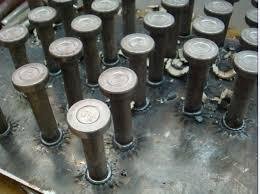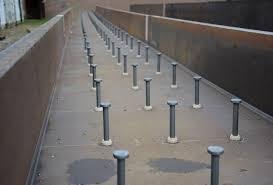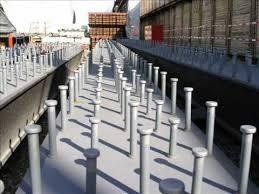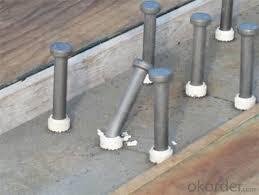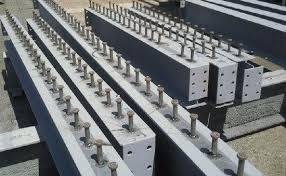Product Description
Shear Connectors Welding Studs ISO 13918
We are Manufacture, Stockholder & Distributors of ISO-13918 Shear Connector, Shear Stud, Welding Stud, Type SD1, Type SD2, AWS D1.1, AWS D1.5, BS 5400 in Mild Steel, Carbon Steel, Low Carbon Steel, Stainless Steel used in Steel Building, Bridges
We are leading global manufacturer and distributor of weld stud fasteners and application equipment
serving a broad range of markets on a worldwide basis including the automotive, construction and industrial markets.
Stud welding products are suitable for the fastening needs of virtually every industry and our products include externally threaded fasteners, shear connectors, concrete anchors, punching resistor studs, and the equipment used to apply, assemble and weld these items.
Through years of design, engineering and manufacturing excellence, we have perfected the
durability of our fastener products for use in high stress environments from applications such as offroad
construction equipment, large expansion bridges and skyscrapers to high performance autos,
nuclear power plants and equipment used in high temperature environments
Manufacture of Shear Connectors Welding Studs
Manufacture of Shear Connector Studs for ARC Welding
Manufacture of ISO 13918 Shear Connectors Welding Studs
Manufacture of ISO 13918 Shear Connectors
Manufacture of ISO 13918 Shear Studs
Manufacture of ISO 13918 Welding Studs
Manufacture of AWS D1.1 Shear Connector Welding Stud, Shear Stud, Welding Stud
Manufacture of AWS D1.5 Shear Connector Welding Stud, Shear Stud, Welding Stud
Stockholder of Shear Connectors Welding Studs
Stockholder of ISO-13918 Shear Connectors Welding Studs
Stockholder of Shear Connector Studs for ARC Welding
Stockholder of ISO-13918 Shear Connectors
Stockholder of ISO-13918 Shear Studs
Stockholder of ISO-13918 Welding Studs
Stockholder of AWS D1.1 Shear Connector Welding Stud, Shear Stud, Welding Stud
Stockholder of AWS D1.5 Shear Connector Welding Stud, Shear Stud, Welding Stud
Distributors of Shear Connectors Welding Studs
Distributors of Shear Connector Studs for ARC Welding
Distributors of ISO 13918 Shear Connectors Welding Studs
Distributors of ISO 13918 Shear Connectors
Distributors of ISO 13918 Shear Studs
Distributors of ISO 13918 Welding Studs
Distributors of AWS D1.1 Shear Connector Welding Stud, Shear Stud, Welding Stud
Distributors of AWS D1.5 Shear Connector Welding Stud, Shear Stud, Welding Stud
Description
SHEAR CONNECTOR (SHEAR STUD)
The simplest solution for transferring forces in expansion joints is to use the shear connector .
An economical option is to use mild steel shear connectors as energy dissipating.
Shear connectors also named shear studs, concrete anchors, are typically used in composite steel construction to tie the concrete to steel members and resist shear forces between the concrete slab and steel members. They are widely used in steel building, bridges, etc. Welding Through Metal Deck are available for this stud, for this option, special ceramic ferrule type UFT are recommended.
Shear connectors meet the following standards as below.
ISO 13918: 2008: 2008 Welding – Studs for arc stud welding, type SD1
AWS D1.1: 2015 Structural Welding Code – Steel, type B
AWS D1.5: 2002 Bridge Welding Code, type B
AS/NZS 1552.2: 2003 Australian/New Zealand Standard – Structural Stud Welding
BS 5400: 2005 Steel, Concrete and Composite Bridges
GB/T 10433: 2002 Cheese Head Studs for Arc Stud Welding
JIS B 1198-1995 Headed Studs
Composite Steel Flooring Construction Headed Shear Connector Studs
Shear connector studs are made of a material suitable to be welded by arc melting.The dimensions and design of the connector are in accordance with the BS - EN ISO13918:2008.
Main Features
1. Shear Connector Studs are designed to tie the concrete to the steel beams and to resist shear loadings between the concrete slab and steel beam in composite construction.
2. Shear studs are used in stud welding to secure steel framed buildings to create a shear connection between the steel and the concrete. We supply and fix all available sizes of welded shear studs for through deck and straight to steel welding.
3. All our products meet the current standards and specifications.
|
Mechanical Properties of Shear Stud Connector
|
|
Standard
|
Tensile strength
|
Yield strength
|
Elongation
|
|
BS EN ISO 13918 SD1
|
≥450MPa
|
≥350MPa
|
≥15%
|
|
AWS D1.1
|
≥450MPa
|
≥350MPa
|
≥15%
|
|
BS 5400
|
≥495MPa
|
≥385MPa
|
≥18%
|
|
Chemical Component of Raw Material (%)
|
|
Material
|
C
|
Si
|
Mn
|
P
|
S
|
Al
|
|
SWRCH15A
|
0.13-0.18
|
≤0.10
|
0.30-0.60
|
≤0.035
|
≤0.035
|
≥0.020
|
|
SWRCH18A
|
0.15-0.20
|
≤0.10
|
0.60-0.90
|
≤0.030
|
≤0.035
|
≥0.020
|
|
Q345D
|
≤0.18
|
≤0.50
|
≤1.70
|
≤0.030
|
≤0.025
|
≥0.015
|
The Process
Electric-Arc stud welding is the most common process and is utilized whenever metal is fabricated. It
is used to best advantage when the base plate is heavy enough to support the full strength of the
welded studs, but is sometimes used with lighter gauge material.
The Stud is held in the welding gun with the end of the stud placed against the work. The cycle is
started by depressing the trigger button start switch. The stud is then automatically retracted from
the work piece to establish an arc. The arc continues for predetermined period of time until portions
of the stud and the base plate have been melted. Then, the welding gun automatically plunges the
stud into the molten pool of metal and holds it there under spring pressure. At the same time, the
welding current is stopped and, when the molten metal solidifies, the weld is completed and the
welding gun is removed from the stud.
The molten metal is held in place by a ceramic ferrule which also serves to shield the arc. The weld
metal is deoxidised by a flux in the weld end of the stud. This results in a dense, strong weld which
will develop the full strength of the stud and base plate. The weld cycle depends on the diameter of
the fastener and materials being joined and varies in time from 1/10 to 1-1/2 seconds. Welding
currents range from 250 to 3000 amps.
Welding Thru deck
The best welding results are achieved through adherence to recommended job-site procedures and
conditions. Factors such as painted beam flanges, water, deck fit-up to the beam, and inadequate
power can seriously hamper satisfactory welding.
Here are some important site requirements:
Top flanges of beams must be unpainted (or at least a strip where the studs are to be
welded).
Remember if fire protection coating is applied to the rest of the beam (top uncoated) prior
to stud welding, that touch up may be required after the studs have been welded. (The heat
from stud welding may activate the fire protection)
The beams should be free of heavy rust and mill scale
The beams should be free of dirt, sand and other materials
Galvanised beams will need to be ground back to remove the galvanising
Water on the deck, or between the beam and deck must be removed before welding
Shear Connectors
Shear connectors deliver code specified shear strength values as used in composite
construction, securing concrete to steel structural components. Nelson shear connectors meet
requirements of the following codes:
AS/NZS 1554.2 Structural steel welding Part 2: Stud Welding (steel studs to steel)
AWS D1.1 Structural Welding Code – Steel
AWS D1.6 Structural Welding Code – Stainless Steel
AWS D1.5 Structural Welding Code / AASHTO Standard Specification for Highway Bridges
Canadian Standards Association W59 – Welded Steel Construction
AISC Manual of Steel Construction – Allowable Stress Design
AISC Manual of Steel Construction – Load & Resistance Factor Design
Shear connectors are typically used in composite steel construction for holding concrete slabs to
steel members to resist shear forces and increase shear loading capacity in steel buildings, bridges,
columns caissons, containment liners, etc. They also act as embedment anchors on miscellaneous
embedded plates, frames, angles, strip plates, attachments and connections.
Short form specification
To ensure that certified products are used, the following specification is suggested. “Headed anchors
shall be Shear Studs, flux filled welding to plates as shown on drawings. Studs shall be made
from cold drawn steel Grades to I C -1010 through C – 1020 per ASTM A-108 and shall be welded per
manufactures recommendation”
Shear capacity
Headed shear studs embedded in concrete with an embedment length more than four times their
diameter are capable of developing full shear capacity. Spacing is not as sensitive in shear as in
tension. Spacing four times diameter between studs in plane perpendicular to the shear force and
six times diameter in the direction of the shear force is generally adequate to develop full stud
capacity. Free edges in the direction of the shear force and some spacing restrictions along a free
edge apply. Use proper safety factors and edge reinforcement.
An upper bound limit for headed studs as approached at 0.9 As fs when concrete strength exceeds
35Mpa
Headed studs used as inserts have different values than those employed in composite design. For
shear capacity of studs in composite design with or without metal deck see appropriate code and
commentary.
Shear Connector Weld Studs are unthreaded with an upset head.
Designed to interconnect the concrete slab to the load bearing steel beams.
Because of the inter connection or composite construction resists shear loading
between the concrete and steel beams. Meets with AWS and all other applicable
specifications. Used in all types of concrete connections.
They can be welded to flat or vertical surfaces, or to the inside or outside of an angle.
Material – Low carbon steel, ASTM A29, 1010-1020. Also available in a weldable stainless steel.
Type 302 is the most commonly used. Other grades available on request.
Please contact us for your specific needs.
Length: Length listed is before weld. Stud diameters less than 5/8” will be
approximately 1/8” shorter after weld – Stud diameters 5/8” – 3/4” will be
approximately 3/16” shorter – Stud diameters 1” will be approximately 1/4” shorter after weld.
Benefits of Using Shear Connector Weld Studs
Speed, applying a stud takes less than a second
Single sided, no access to the opposing side needed
Strong, creates a full cross section weld
Stable, will not work itself free like a pres-in fastener
Speed of training, no special skills and very little training needed to install
Inspection & Approval Certificates : C/W Certificate (Calibration Works Certificate) EN 10204 3.1 / DIN 50049 3.1 / ISO 10474 3.1 Mill Test Certificate, NACE MR-0103 / NACE MR-0175 / ISO 15156, CE Marked, European Pressure Equipment Directive PED-97/23/EC, AD-2000-WO, ASME Boiler & Pressure Vessel Code Sec.II Part A Ed. 2015, API 6A (American Petroleum Institute), with 3.2 certificate duly Certified & Approved by LRS (Lloyd's Register), GL (Germanischer Lloyd), BV (Bureau Veritas), DNV (Det Norske Veritas), ABS (American Bureau of Shipping), SGS, TUV, RINA, IRS, NORSOK Approved Standard M-630, M-650 Rev.3
If you have any requirement of above items, please feel free to contact us
Regards,
CONTACT PERSON :
MUKESH SHAH
Director
Mobile No. 0091 - 9820292499
Email - marketing@rolexmetals.com
ROLEX METAL DISTRIBUTORS
( A METAL & STEEL Company )
57-A, KHATARGALLI,
THAKURDWAR,
MUMBAI - 400002, INDIA.
TEL.No. 0091-22-23858802
TEL.No. 0091-22-23823963
FAX No. 0091-22-23898724
Email - marketing@rolexmetals.com
Website – www.rolexmetals.com
CHAIRMAN – chairman@rolexmetals.com
MANAGING DIRECTOR – managingdirector@rolexmetals.com
TECHNICAL DIRECTOR – technicaldirector@rolexmetals.com
SALES DIRECTOR – salesdirector@rolexmetals.com
COMMERCIAL DIRECTOR – commercialdirector@rolexmetals.com
COMMERCIAL MANAGER – commercial@rolexmetals.com
GENERAL MANAGER – generalmanager@rolexmetals.com
SALES MANAGER – salesmanager@rolexmetals.com
PURCHASE MANAGER – purchasemanager@rolexmetals.com
TECHNICAL MANAGER – technical@rolexmetals.com
WORKS MANAGER – worksmanager@rolexmetals.com
STORES MANAGER – stores@rolexmetals.com
WAREHOUSE MANAGER – warehouse@rolexmetals.com
SALES DOMESTIC – salesdomestic@rolexmetals.com
SALES INTERNATIONAL – salesinternational@rolexmetals.com
SALES GENERAL – sales@rolexmetals.com
PURCHASE GENERAL – purchase@rolexmetals.com
FINANCE MANAGER – finance@rolexmetals.com
ACCOUNTS MANAGER – accounts@rolexmetals.com
GENERAL INFORMATION – info@rolexmetals.com
EXPORT MANAGER – export@rolexmetals.com
IMPORT MANAGER – import@rolexmetals.com
AIR EXPORT – airexport@rolexmetals.com
SEA EXPORT – seaexport@rolexmetals.com
CUSTOMS – customs@rolexmetals.com
AIR FREIGHT – airfreight@rolexmetals.com
SEA FREIGHT – seafreight@rolexmetals.com
DESPATCH – despatch@rolexmetals.com
INSPECTION – inspection@rolexmetals.com
LOGISTICS – logistics@rolexmetals.com
TRANSPORT – transport@rolexmetals.com
KALAMBOLI WAREHOUSE – kalamboli@rolexmetals.com
TALOJA WAREHOUSE – taloja@rolexmetals.com
KHOPOLI WAREHOUSE – khopoli@rolexmetals.com
NHAVA SHEVA WAREHOUSE – nhavasheva@rolexmetals.com
KANDLA WAREHOUSE – kandla@rolexmetals.com
MUMBAI WAREHOUSE – mumbai@rolexmetals.com
STOCKYARD – stockyard@rolexmetals.com
SERVICE – service@rolexmetals.com
SUPPORT – support@rolexmetals.com
RECRUITMENT – career@rolexmetals.com
WEBMASTER – webmaster@rolexmetals.com
CUSTOMER CARE – customercare@rolexmetals.com
Product Image
